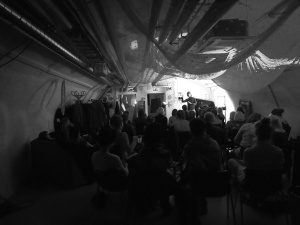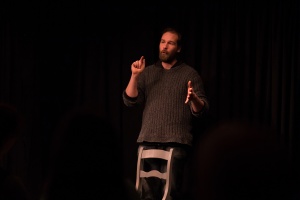Shaibalaiba! Story Cafés

Description
The Shaibalaiba! Story Cafés, held in Helsinki since 2011, keep the tradition of storytelling alive. The focus at the Story Cafés is on stories – ones you have made up yourself or heard from somewhere else, traditional fairy tales, or strange events. The evenings have a few invited performers and an open stage. The subject and style are free. The Story Café is arranged approximately once per month, and the evenings have had dozens of invited performers and countless storytellers participating on the open stage. The invited performers in the evenings have included performing artists, poets, musicians and art students, as well as people working with storytelling. The Story Café has been held in places such as cafés, restaurants and theatres.
The open stage section, where the audience can tell their own stories, has become an important part of the evenings. People have a desire and a need to be seen, to be heard, to participate and share their experiences and stories. The event’s atmosphere is intimate and accepting, which means that the threshold for participating on the open stage is low.

Background
The community behind the Shaibalaiba! Story Cafés has organised different kinds of storytelling evenings in Helsinki since 2004. Regular Shaibalaiba! Story Cafés started operating in the spring of 2011. The goal was to inspire new people to join in with oral storytelling and create a space for telling and listening to stories.
Oral storytelling has always been a part of human culture. It is said that it is one of humanity’s oldest art forms, in addition to cave paintings, dance and singing. Before the art of printing became common, it was also an important way of preserving and sharing the history, teachings and norms of communities, in addition to providing entertainment. Over time, people have gathered together to share stories. This has been done around campfires, during forest work, in tea rooms, on hikes, at funerals, and in office break rooms. In addition to everyday situations, stories have also been told at royal courts and in the marketplaces of cities. Myths and folk tales are part of our common oral tradition, which has been preserved and developed by both tellers of campfire tales as well as the professional storytellers at court, both in their own ways.
The role of storytellers in society has changed significantly due to the influence of literature, television and radio. Even though the number of practitioners of oral folklore has diminished over time, traditional folk tales, stories and poems have always interested people. Storytelling creates a path to these traditional stories, but it also acts as a means of communication and meeting people in the present day.
Future
More and more people are interested in participating and telling their stories. New and different story clubs are held in different parts of Finland. The Shaibalaiba! Story Café and the Samova ry association cooperate with many different parties, both in Finland and abroad. Future plans include organising workshops and training, increasing cooperation with international storytellers, and developing the Tuulen tuomaa (‘Brought by the Wind’) – Helsinki International Storytelling Festival that has already been held once into a regular event.
The community/communities behind the submission
Samova ry http://www.facebook.com/samovary
Bibliography and links to external sources of information
http://www.samova.wordpress.com/shaibalaiba-tarinaklubit/
Tuulen tuomaa -tarinankerrontafestivaali https://tuulentuomaa.wordpress.com/
Luukkonen, Markus 2015. Tarina, kertoja ja yleisö – Ammattina tarinankerronta. Helsinki: Metropolia AMK http://urn.fi/URN:NBN:fi:amk-201503163221
Haggarty, Ben 2005. Seek out the voice of the critic (Canadian edit). https://crickcrackclub.com/wp-content/uploads/2020/08/CRITIC.pdf
Pellowski, Anne 1990. The World of Storytelling (Expanded and Revisited Edition). Bronx, NY: The H.W. Wilson Company.
Wilson, Michael 2006. Storytelling and Theatre: Contemporary Storytellers and their Art. Hampshire: Palgrave Macmillan.
